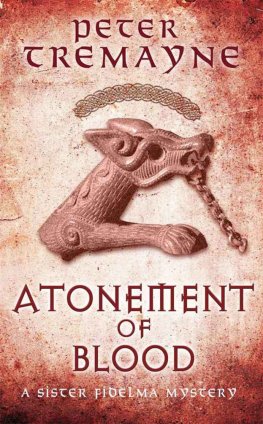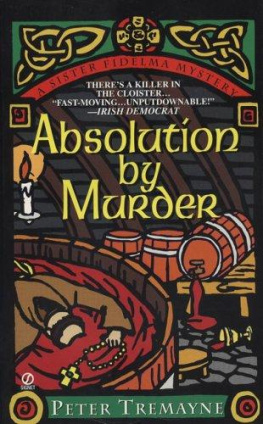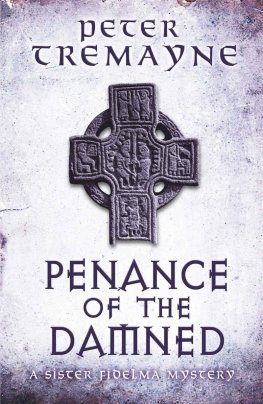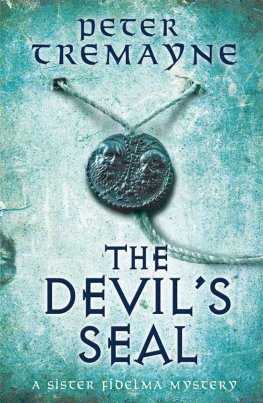Peter Tremayne - Behold a Pale Horse
Here you can read online Peter Tremayne - Behold a Pale Horse full text of the book (entire story) in english for free. Download pdf and epub, get meaning, cover and reviews about this ebook. year: 2012, publisher: St. Martin, genre: Detective and thriller. Description of the work, (preface) as well as reviews are available. Best literature library LitArk.com created for fans of good reading and offers a wide selection of genres:
Romance novel
Science fiction
Adventure
Detective
Science
History
Home and family
Prose
Art
Politics
Computer
Non-fiction
Religion
Business
Children
Humor
Choose a favorite category and find really read worthwhile books. Enjoy immersion in the world of imagination, feel the emotions of the characters or learn something new for yourself, make an fascinating discovery.

- Book:Behold a Pale Horse
- Author:
- Publisher:St. Martin
- Genre:
- Year:2012
- Rating:5 / 5
- Favourites:Add to favourites
- Your mark:
- 100
- 1
- 2
- 3
- 4
- 5
Behold a Pale Horse: summary, description and annotation
We offer to read an annotation, description, summary or preface (depends on what the author of the book "Behold a Pale Horse" wrote himself). If you haven't found the necessary information about the book — write in the comments, we will try to find it.
Behold a Pale Horse — read online for free the complete book (whole text) full work
Below is the text of the book, divided by pages. System saving the place of the last page read, allows you to conveniently read the book "Behold a Pale Horse" online for free, without having to search again every time where you left off. Put a bookmark, and you can go to the page where you finished reading at any time.
Font size:
Interval:
Bookmark:
Peter Tremayne
Behold a Pale Horse
And I looked, and behold a pale horse: and the name that sat on him was Death, and Hell followed with him
Revelation 6:8CHAPTER ONE
The elderly man was obviously a religieux. He wore the corona spina, the tonsure of St Peter, and a long brown woollen homespun cloak over a robe of similar material, with leather sandals on his feet. Marking him as being above the lower orders of religious brethren, he carried a staff of office topped with a small silver hook as if it were a crozier of the type a bishop might use.
He hurried by Sister Fidelma without a glance, the soles of his sandals slapping on the cobbles of the narrow street. Fidelma was sheltering under the thatch cover of a little house in the crowded section of the old seaport where she had found lodgings. She barely glanced up as the man passed her, registering the details only subconsciously. In truth, she was bored and her mind preoccupied with the question of how she could pass the time; pass another day in this dreary harbour town where she had been stranded for several days.
It seemed a lifetime ago since she had left Rome to travel down the Tiber to the seaport of Ostia and thence obtain a passage for Massilia. Everything appeared to go well at first. The ship set sail with a blustery wind from the south-east, and the captain was confident of an easy voyage. Before theday was out, however, everything had gone wrong. The wind suddenly changed direction, a storm came out of nowhere and a sail was ripped, a spar cracked and the ship was driven against some rocks, splintering the planking around the keel. Fidelma could not blame the captain for poor seamanship. In fact, he had saved the lives of his passengers and crew by being able to bring the crippled vessel into the nearby natural harbour of Genua before it sank. The sailors seemed to consider this as a blessing from the old gods. When Fidelma inquired why, she was told that Genua was named from the two-headed god Giano, who was the protector of ships. The superstitious sailors felt the god had reached out to save them.
The fact remained that the ship was beyond immediate repair. Fidelma was assured that the seaport of Genua was the crossroad of commerce and that she should easily be able to secure a new passage to Massilia. However, the assurances proved wrong. There were few ships in the harbour and none heading for Massilia nor to any adjacent port. There was some rumour that a Frankish fleet might be heading for the seaport and talk of war in the air, but she took no notice. Fidelma had wandered the back streets around the harbour until she was directed to a small hostel which catered for religious pilgrims. She had no complaints about the hospitality, but the days were long in passing and there was no sign of any ship on which she might continue her journey.
Genua was not a place which held her attention. The old woman who ran the hostel had related the general history of the area within one brief conversation. In recent years, various conquerors had seized the seaport for strategic reasons and it was here the ships of the ruling Byzantines had once harboured while they tried to stop the invading Germanic tribes, the Longobards, who now held sway and had mixed their culturein this centre of commerce. Alboin and his Longobards had swept down the entire Italian peninsula during the previous century and conquered it, with the exception of isolated territories such as the lands around Rome itself, which clung to their independence. Some thirty-six powerful Longobard dukes now ruled under their King.
Among the languages of the seaport, she could hear various tongues, and Fidelma could now distinguish the harsh gutturals of the language of the Longobards from the others. However, she was thankful that Latin was still the language of general communication, for at least she was able to make herself understood.
She was dwelling on these matters when the elderly religieux had hurried by. Some part of her mind registered this fact but would have dismissed it, had it not been for the two men following in his footsteps. It was their manner that caused her to glance up and give her full attention. They were hooded, their dark cloaks covering their tall figures, and they were bent forward, giving the impression of serious intent; one, at least, carried a cudgel in his right hand. Fidelma realised that this was what had caught her attention. The mans cloak had flapped back as he passed, thus momentarily revealing the weapon. They both seemed to be treading carefully, as if to avoid making the same noise on the cobbles that had marked the passage of their quarry.
Fidelma did not think about consequences. If there was some knavery here, then her training as a dlaigh an advocate of the laws of her own land, now part of her very being caused her to move automatically. Quietly, she followed the two men as they shadowed the elderly religieux along the narrow street. There were only two or three people moving along in the opposite direction and no one took anynotice of them. Then they approached a stretch which was devoid of people. One of the men began to increase his stride, and some instinct caused Fidelma to slip into the shelter of a tiny recess between the buildings just as the second man turned his head and glanced back, as if to check whether anyone else was on the street. When she peered cautiously out again, she saw that both men were closing rapidly on the elderly man. He seemed unaware of their presence. The leading pursuer had already raised his cudgel to strike.
Fidelma found herself throwing caution to the wind and running after them.
Caveo! Caveo! she cried loudly in Latin.
The elderly religieux turned at her cry and met the downward strike of the cudgel with a dexterous movement of his staff, fending off the blow.
The second attacker turned immediately to face Fidelma and she realised that he also held a cudgel. He raised it as he ran back towards her. What happened next was over in a few seconds. Still running forward, she suddenly ducked and halted. Her antagonist had no time to stop his forward momentum. He went flying across her crouched body and came down heavily on the cobbles, his cudgel spinning from his hand. Fidelma swung round and kicked the weapon further from him as he lay momentarily winded on the ground.
She had only used the art of the troid-sciathagid a few times before. She had used it once in Rome not so long ago when she had been attacked. It was a traditional technique of her people, called battle through defence which had been taught in ancient times by those wise teachers who felt it wrong to carry arms to protect themselves. In these violent times, lonely missionaries were often attacked, robbed and sometimes killed. Now, many of the peregrinatio pro Christo,the missionaries who went abroad, learned how to defend themselves in this manner without the use of weapons.
Fidelma adopted a defensive posture, ready to confront her attacker again. His cloak had fallen open and her eyes caught an embroidered symbol on his right shoulder. It was a curious design, like a flaming sword surrounded by a laurel wreath. She was still looking at it when there was a shouted instruction from behind her. The next moment, the first attacker brushed roughly by her, running down the street. His companion rolled over, came to his feet and joined him. Both of them disappeared swiftly into some side alley. Fidelma hesitated, not knowing what to do next, when a voice behind her called in Latin: Let them go, Sister. Let us not take chances.
She turned back to the elderly man, who stood leaning on his staff. There was a slight abrasion on his forehead and a trickle of blood.
Are you hurt? she demanded, moving forward.
Font size:
Interval:
Bookmark:
Similar books «Behold a Pale Horse»
Look at similar books to Behold a Pale Horse. We have selected literature similar in name and meaning in the hope of providing readers with more options to find new, interesting, not yet read works.
Discussion, reviews of the book Behold a Pale Horse and just readers' own opinions. Leave your comments, write what you think about the work, its meaning or the main characters. Specify what exactly you liked and what you didn't like, and why you think so.









